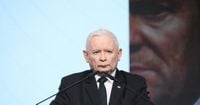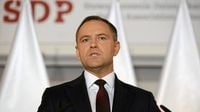In a significant declaration, Magdalena Biejat, a candidate for the presidency from the Nowa Lewica party and Deputy Marshal of the Senate, has committed to advocating for increased salaries for teachers, emphasizing their hard work and social contributions. This statement comes in the wake of a letter sent by the Polish Teachers' Union (ZNP) to all 13 presidential candidates, urging them to engage in discussions about the future of education in Poland. The ZNP highlights a concerning trend over the past two decades, noting a dramatic decline in the prestige of the teaching profession.
In her responses to the ZNP's inquiries, Biejat stressed the importance of decent earnings as a key factor in restoring the status of teachers. “I will stand guard over raising the salaries that teachers receive for their hard and socially useful work,” she declared. Additionally, she believes that the regulations governing the teaching profession should remain separate, as they were during the Second Polish Republic, ensuring that teachers have a distinct legal framework that supports their unique role in society.
Biejat also addressed the need to attract young people to the teaching profession, suggesting that adequate salaries, increased safety in the workplace, and the preservation of current working hours are essential. She firmly stated that the salary system for teachers should be linked to the average salary in the economy, arguing that this connection would reflect the value of educators in society.
On the controversial topic of educational vouchers, Biejat expressed strong opposition, stating, “I unequivocally oppose such solutions that would lead to the destruction of the education system. I will veto any legislation concerning educational vouchers.” Furthermore, she is against making all studies in Poland subject to tuition fees, promising to veto any bill that moves in that direction.
The ZNP plans to publish all candidates' responses to their questionnaire, emphasizing the importance of transparency and accountability in the electoral process. They are eagerly awaiting the positions of other candidates regarding educational reforms.
In the political landscape, a recent presidential poll conducted by United Surveys for Wirtualna Polska on May 7, 2025, indicates that Rafał Trzaskowski is leading the race for the presidency with 33.2% of the vote, a 1.6 percentage point increase from the previous poll conducted on April 28-29. This surge in support comes amid growing scrutiny of his opponent, Karol Nawrocki, who has seen a decline in support, now at 23.2%, down 1.5 percentage points.
Other candidates in the poll include Sławomir Mentzen with 13.6%, Szymon Hołownia at 7.5%, and Magdalena Biejat, who garnered 6.1% of the respondents' support. The survey also explored potential outcomes of a second round of voting, where Trzaskowski would win 54.8% of the votes against Nawrocki's 37.1%. This represents a notable shift in voter sentiment, particularly in light of recent controversies surrounding Nawrocki's real estate dealings.
Nawrocki, who has faced criticism over his property ownership, defended himself by stating, “I live in a 59-square-meter apartment for which I am still paying a mortgage. According to the land registry, I also own a 28-square-meter studio apartment, to which I do not have the keys. I acquired it because I was helping an elderly person. I have never financially benefited from this apartment.”
However, investigative reports have revealed discrepancies in Nawrocki's claims regarding his care for the elderly individual in question. Journalists have located Jerzy Ż., the elderly man, who has been residing in a state-run nursing home in Gdańsk since April 2025. This revelation raises further questions about Nawrocki's integrity and his ability to connect with voters amid growing scrutiny.
During a debate organized by various media outlets, candidates were questioned about the state of the rule of law in Poland. Nawrocki proposed a referendum to allow citizens to determine the future of the justice system if he were to become president. In contrast, Szymon Hołownia advocated for a careful review of judicial nominations, emphasizing the need for reform without resorting to drastic measures.
Other candidates, such as Marek Jakubiak and Adrian Zandberg, have also expressed their views on the necessity of constitutional reforms to address the current challenges facing the Polish justice system. The discussions surrounding these issues reflect the broader concerns of voters regarding governance and accountability.
As the presidential election approaches, voters residing abroad will also have the opportunity to participate in the electoral process. According to a regulation from the Ministry of Foreign Affairs, polling stations will be established for Polish citizens living outside the country. Voters can register through the e-Elections system without needing an electronic signature, but must complete their registration by May 13, 2025.
Voting will take place on May 18, 2025, with early voting in North and South America on May 17. The Ministry emphasizes that the e-Elections system is solely for voter registration, and actual voting must be conducted in person. This initiative aims to ensure that Polish citizens abroad can exercise their democratic rights and participate in shaping the future of their country.
Despite ongoing polarization in Polish politics, many citizens view the upcoming election as a contest primarily between Trzaskowski and Nawrocki, reflecting broader party affiliations and historical rivalries. The outcome of this election could significantly influence the political landscape and the direction of governance in Poland for years to come.



